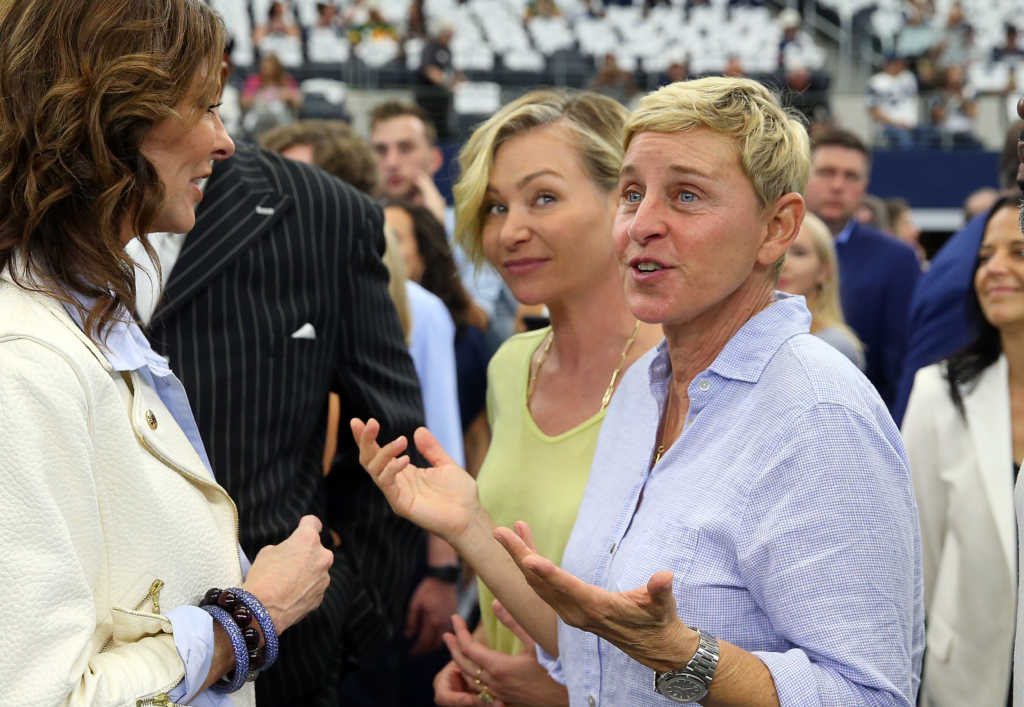In this age of new tolerance, which is, in actuality, in competition with true tolerance, Ellen DeGeneres is harkening back to the what it really means to coexist with someone with whom you disagree.
DeGeneres found herself in the limelight over the weekend, when some praised and others condemned her for deigning to sit with former President George W. Bush, a man with whom the daytime talk show host has many disagreements.
Despite their disparate worldviews, Bush, a conservative Christian politician, and DeGeneres, a progressive Hollywood entertainer, seemed to enjoy each other ’s company at a Dallas Cowboys football game Sunday. In fact, the “Ellen” host even described the Republican as “a friend” during her Tuesday monologue.
As for the Bushes, family spokesman Freddy Ford said Tuesday the former first couple “really enjoyed being with” DeGeneres and her partner, Portia de Rossi, over the weekend.
“Here’s the thing: I’m friends with George Bush,” DeGeneres said. “In fact, I’m friends with a lot of people who don’t share the same beliefs that I have. We’re all different, and I think that we’ve forgotten that that’s OK that we’re all different.”
“Just because I don’t agree with someone on everything doesn’t mean that I’m not going to be friends with them,” she continued. “When I say be kind to one another, I don’t mean only the people that think the same way that you do: I mean be kind to everyone. Doesn’t matter.”

I could run down a laundry list of disagreements I have with DeGeneres. I could also probably name a handful of areas where Bush and I conflict. But just like DeGeneres said, it really doesn’t matter. At least, it doesn’t matter so long as I stick to the old school definition of tolerance.
In an excerpt from his 2012 book “The Intolerance of Tolerance,” theologian D.A. Carson gave us a glimpse into just how subtly our cultural understanding of what it means “to tolerate” has changed over the years. It has shifted from simply accepting the fact that other ideas and beliefs exist, to accepting the ideas and beliefs themselves, which is to (wrongly) say each and every perspective is equally valid, at which point the former understanding of tolerance becomes moot.
Since that paragraph was probably as clear as mud, I’ll show you a couple definitions that maybe illustrate the point a little better. The Oxford English Dictionary defines tolerance as “the ability or willingness to tolerate the existence of opinions or behavior that one dislikes or disagrees with.” So far so good. But then the definition shifts subtly when you turn to the Cambridge Dictionary, which defines tolerance as a “willingness to accept behavior and beliefs that are different from your own, even if you disagree with or disapprove of them.”
The former definition allows for true tolerance: one can hold that their belief is the right belief (i.e., the Christian conviction that Jesus is the only way to heaven) while at the same time understanding the fact that other ideas exist. The latter definition essentially undoes the need for true tolerance because, by calling for the acceptance of the behaviors or beliefs themselves, it is putting all perspectives on equal ground, suggesting, for example, that the Christian conviction that Jesus is the only way to heaven is equally valid to the Muslim conviction that Allah is the only true god.
Carson explained it all this way:
This shift from “accepting the existence of different views” to “acceptance of different views,” from recognizing other people’s right to have different beliefs or practices to accepting the differing views of other people, is subtle in form, but massive in substance. To accept that a different or opposing position exists and deserves the right to exist is one thing; to accept the position itself means that one is no longer opposing it. The new tolerance suggests that actually accepting another’s position means believing that position to be true, or at least as true as your own. We move from allowing the free expression of contrary opinions to the acceptance of all opinions; we leap from permitting the articulation of beliefs and claims with which we do not agree to asserting that all beliefs and claims are equally valid. Thus we slide from the old tolerance to the new.
It’s refreshing to see someone as high-profile as DeGeneres asking her viewers to prioritize true tolerance in their interactions with other people. Just like the host said, it’s easy to be kind and loving toward those with whom we agree; the true act of tolerance is showing kindness toward those with whom we disagree, and being OK with the space that exists between our opposing ideas.
We should all be a little more like Dubya and DeGeneres.



